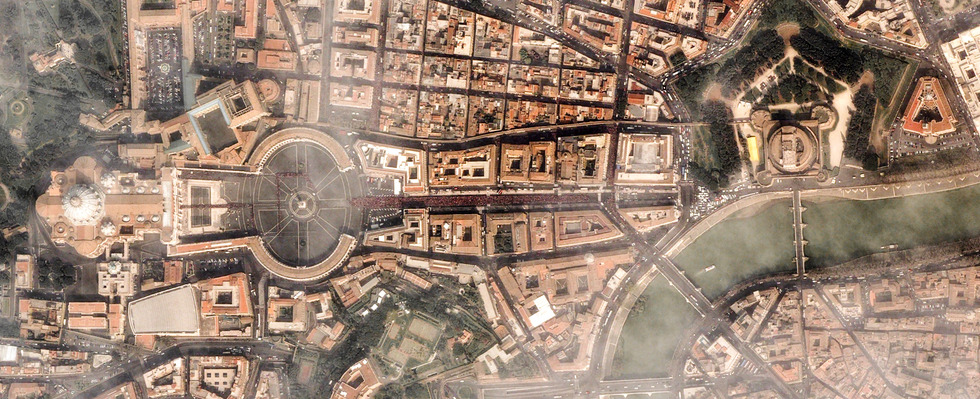Vatican
Andrea Gagliarducci FAITH MAGAZINE November - December 2014
The Synod: In Search of Identity
What an extraordinary Extraordinary Synod of Bishops we are having. I write as the second half of this year’s gathering gets under way. The theme of next year’s phase of the Synod was announced 13 October, immediately after the reading of the Relatio Post-disceptationem, or mid-term report, which marked the end of the first half of this Synod.
The announcement made clear that the present Extraordinary Synod for the Family – to be held at the Vatican from 5 to 19 October 2015 – is just part of a two-year path. So this year’s final document issued by the synodal fathers will be but a preparatory document for the next Synod. The topic will be slightly different: 2015’s theme will be “Vocation and mission of the family in the Church and in the contemporary world”. This year’s has been “The family in the context of new evangelisation”.
The pre-discussion Relatio, signed by Cardinal Peter Erdo, identified all the issues at stake. Far from dealing just with the issue of access to Holy Communion for those who are civilly remarried, the Relatio had much more to say, as we all now know! There seemed to be a desire to shape global norms for pastoral practice.
“It is particularly useful for the bishops of the local communities to be offered clear guidelines to help those living in difficult situations,” since “it is unrealistic to expect that by themselves they will find the right solutions in conformity with the truth of Gospel and nearness to the individual in a particular situation,” the document read. It did not, however, present new doctrine. That’s worth remembering.
The Relatio read that “a missionary conversion is required”. It is not enough to stop at an announcement “that is merely theoretic and has nothing to do with people’s real problems”, since “it must not be forgotten that the crisis of faith has led to a crisis in matrimony and the family and, as a result, the transmission of faith from parents to children has been interrupted”.
The focus on a new way of communicating the Gospel was much in evidence during the discussion among the synodal fathers. During the first week of discussions, most of them have spoken about a change of paradigm in communications. That change was very noticeable in the post-discussion document.
This latter is one of the means by which news from this synod of bishops is disseminated. Usually, synodal fathers draft and vote on a series of propositions, to be delivered to the Pope, who in turn chooses whether to make the document public or not.
This synod did not vote on the propositions, but produced a final document of syntheses. This will be the basis for the working document of next year’s synod’s on family.
It is easy to understand that Pope Francis will be wanting to publish the document, thus giving the Church a clear indication of the direction taken. For the first time, he appointed a group of six prelates to assist the general rapporteur and secretary of the synod, Cardinal Erdo and the Archbishop of Chieti-Vasto, Bruno Forte, in drafting the final document.
These six are the president and deputy of the Commission for the Message, Cardinal Gianfranco Ravasi, president of the Pontifical Council for Culture; Archbishop Victor Fernandez, rector of the Catholic University of Argentina; the general superior of the Congregation of Jesus, Fr Adolfo Nicolás; Archbishop Carlos Aguiar Retes, president of the Latin American Bishops Conference; Cardinal Donald Wuerl, archbishop of Washington; and the bishop of Cheju, South Korea, Peter Kang-U-il.
The group had been appointed “in order to give light to all the issues”, and will be entrusted as “pastoral advisers” based on their pastoral experience, according to the Archbishop of Dublin, Diarmuid Martin. Noteworthy is the absence among them of any representative from Africa, despite African bishops having been among those who had voiced some of the crucial concerns on family issues.
As well as a weakening of the natural family, African countries are now facing the pressure of multinational companies and international organisations to introduce legislation for same sex-marriages and gender-oriented laws, which they cannot accept.
Not by chance, one of the strongest and at the same time most sensitive stances on gay marriages came from Bishop Ignatius Kaigami of Davos. Questioned about homosexuality, he stressed that the Church has fought more than any other group in Africa to stop discrimination against homosexual people, and at the same time he clearly stressed that the family is formed from a man and a woman, open to procreation and following the teaching of the Catholic Church.
Andrea Gagliarducci is an Italian journalist. He is the Catholic News Agency’s Vatican analyst.






